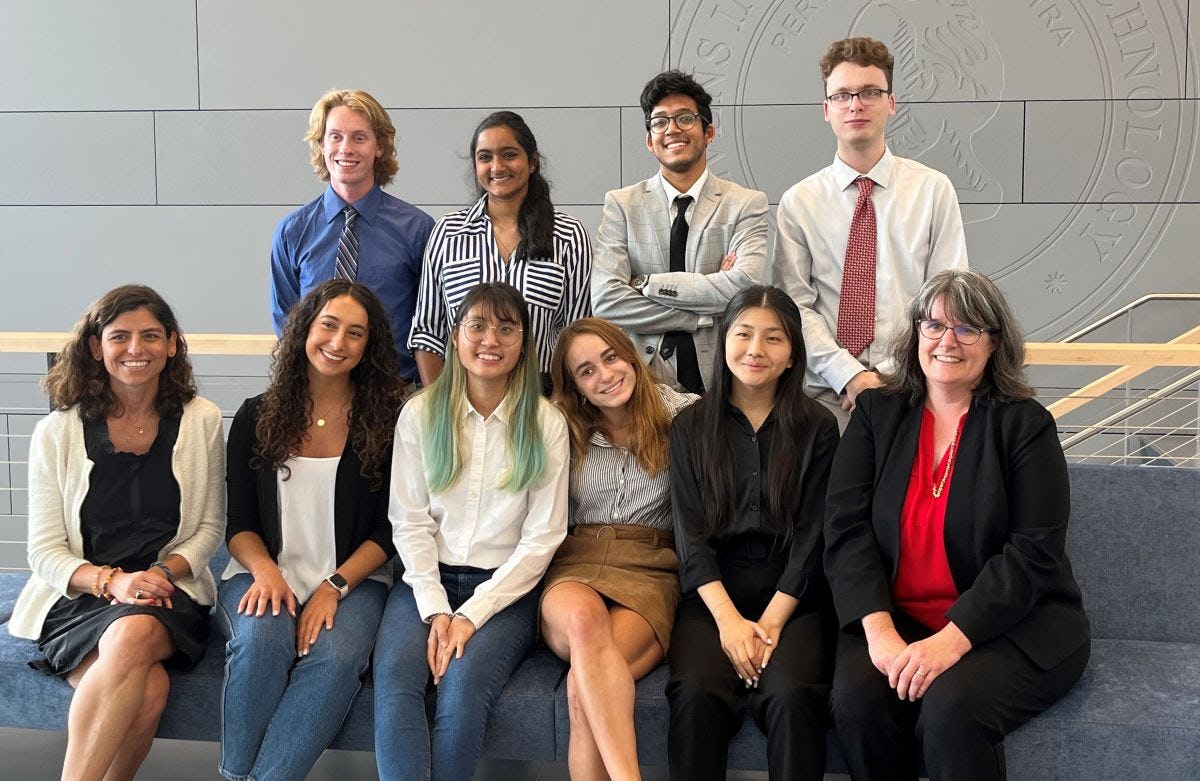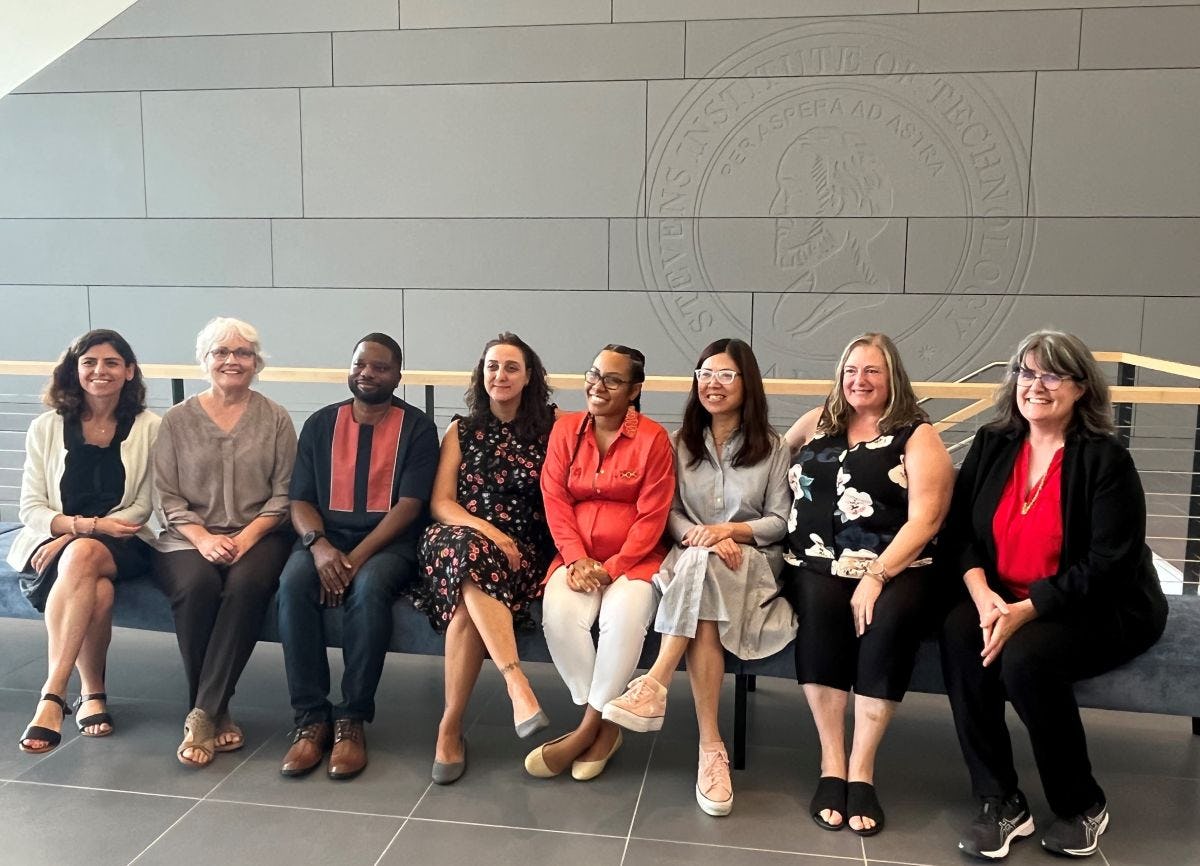Eight undergraduate students and four high school teachers spent their summer break immersing themselves in immersive research at Stevens
During the school year, Oghaghare Okobiah teaches physics at Queens High School for Language Studies. This summer, though, he put himself through a battery of vibrant and innovative research projects – literally. Thanks to an innovative program sponsored by the National Science Foundation (NSF), he spent four weeks at Stevens Institute of Technology working with Jae Chul Kim, assistant professor of chemical engineering and materials science, also known as “the battery guy.”
“Dr. Kim is tackling challenging issues in green technology by offering transformative ideas for the development of advanced energy storage platforms,” said Okobiah, one of four teachers and eight undergraduate students who participated in the second-annual Research Experiences For Undergraduate Students (REU)/Research Experiences For High School Teachers (RET) Site: Interdisciplinary Research Experience in Sustainable Energy and Bioengineering.
Funded through a three-year, $374,971 NSF grant, the REU/RET Site experience at Stevens is led by Pinar Akcora, associate professor in the Department of Chemical Engineering and Materials Science, and Patricia Muisener, teaching professor in the Department of Chemistry and Chemical Biology.
Through this vibrant research environment, college students have 10 weeks to gain experience and networking to help them become independent researchers with entrepreneurial thinking skills. Living on campus during the program allows them to build a close community of undergraduate researchers. At the same time, high school teachers spend four weeks gathering creative approaches to engaging their classes in sustainable energy and bioengineering to fill the STEM pipeline.
“One of the best ways to become familiar with research is to experience science and mentoring in novel, federally funded research projects, but undergraduate students often don’t get to do research in the lab,” said Akcora, who participated in an REU program during her college experience. “Through our REU/RET Site program, students work with faculty mentors to do the experiments and see the challenges first-hand in the professors’ labs, then they make presentations. They also receive mentoring from Patricia and me as well as from their research advisors.”
In a unique twist, the students also teach the teachers.
“After the first six weeks, when the high school teachers joined, the REU students gave ‘chalk talks’ to introduce them to their research projects, and then mentored the teachers on those projects,” said Muisener. “Based on the lab research, the teachers ultimately created lesson plans that they will employ in their classroom and share with others to inspire students into STEM.”
This year’s REU/RET Site program offered fascinating research opportunities with eight Stevens faculty members:
Understanding Environmental Interactions of Poly (acrylic acid) Grafted Silica in Water with Pinar Akcora (Chemical Engineering and Materials Science)
Characterizing the Nanoscale Surface Behavior of Multifaceted Ni-Based Bimetallic Catalysts Using Density Functional Theory with Alyssa Hensley (Chemical Engineering and Materials Science)
Improving of Lithium Iron Phosphate Batteries by Replacing 65% Iron Atoms with Manganese with Jae Chul Kim (Chemical Engineering and Materials Science)
Design of a Sliding Cap for the Hypersonic Wind Tunnel at Stevens with Nick Parziale (Mechanical Engineering)
Role of Collagen in the Repair Response Following Damage to the Intestinal Epithelium withAnsu Perekatt (Chemistry and Chemical Biology)
Synthesis of Rare Organoboron Compounds via a Novel Boron-Promoted Conjugate Addition Reaction with Abhishek Sharma (Chemistry and Chemical Biology)
Appearance of White Matter Hyperintensities in the Healthy Aging Brain with Johannes Weickenmeier (Mechanical Engineering)
Testing the Understandability of Real-Time Optical Motion Capture Balance Sonification Systems with Antonia Zaferiou (Biomedical Engineering)
“Doing research at Stevens was amazing,” said Vibha Iyer, who worked with Zaferiou to test participants’ understanding of sonification systems used to correct and improve balance in walking and turning. “I had only conducted quantitative, programming-based research, but this summer I worked on a qualitative, human-based project. It transformed my view of what research could be. The professors and graduate students taught me so much about their fields as well as hard and soft skills required for research. I have learned how to work with humans in research and account for all the variability that comes from this, as well as how to steadily work toward a goal. Additionally, just getting to walk around and learn about the fascinating projects being conducted at Stevens expanded my perspective of the benefits of research.”
Muisener also held research seminars on ethics, abstract writing and deep learning/chemistry education and research while Akcora discussed graduate school and NSF fellowship opportunities. Additional program support came from Mariel Kolker, a Morristown, N.J., high school teacher with RET experience who mentored participants and led a workshop on brainstorming and collaborating; and Deborah Brockaway from the Stevens Center for Innovation in Science and Engineering (CIESE), who worked with teachers on their lesson plans and provided a workshop series.
Stevens faculty and staff also participated in the REU/RET education component. These options included librarians Vicky Orlofsky and Courtney Walsh offering seminars on literature searching and citations; Xhiljola Ruci Kluger, director of community standards and Title IX coordinator, discussing the federal sex discrimination in education law; Alex Chou, staff scientist, providing microscopy demonstrations; Mary Ann Piazza, executive portfolio manager in the Office of Innovation and Entrepreneurship, giving a workshop on patents and licensing as part of the Innovation and Research Scholars program; and Wei Zheng, associate professor in the school of business, sharing insights on developing effective mentoring techniques.
Individual and group meetings, lab tours, and weekly Meet the Prof sessions rounded out the experience. The program culminated with a research symposium, where attendees presented their posters highlighting their learnings.
“I enjoyed the support and the exposure to frontiers of scientific research and the mentoring of how to use these resources to design curriculum that seeks to engage and prepare students with the skills and knowledge needed in this 21st century and beyond,” Okobiah said. “My expectation as I implement this new lesson plan is to engage students in the sustainability aspect of energy and the environment. We would be building a simple battery using household materials to replicate what happens in a laboratory environment. My goal is to get students enthusiastic about STEM-related careers and hopefully engage in one of those as their choice beyond high school.”
It's a rewarding program for the faculty as well.
“It’s satisfying to invest in these students, and in the teachers who teach the next generation,” Akcora said. “Although many undergraduate students prefer to go into industry when they graduate, we need more Ph.D. students to support technological advances and the global economy, and through this program, we’re encouraging students to continue on with graduate studies.”
“The REU program brings a diverse group of students from across the country to our campus, creating a tight-knit community that learns from each other and gets extensive insight into research labs and methods as well as professional tools,” added Weickenmeier, who also led a research segment in last year’s program. “It’s exciting to help them grow, to build these connections with students from other schools, to recruit motivated and well-trained students and to extend our lab’s network.”
The 2022 Summer REU participants were:
Vibha Iyer, a biomedical engineering major from Georgia Institute of Technology;
Hannah Levy, a chemical engineering major from the University of Florida;
Cindy Lin, a biomolecular science major from New York University;
Nick Marchuk, a mechanical engineering major from Boston University;
Grace McGraw, a mechanical engineering major from the University of Notre Dame;
Seena Seon, a chemical engineering major from Cooper Union;
Mahein Shah, a chemical engineering major from New York University; and
Thomas Robinson, a chemical engineering major from Clarkson University.
The 2022 RET participants, all from New York City, were:
Medinah Eatman, a biology and living environment teacher from Mott Hall V;
Marissa Maggio, an AP biology and urban ecology teacher from Stuyvesant High School;
Oghaghare Okobiah, a physics teacher from Queens High School for Language Studies; and
Sui King Shum, a teacher of physics, chemistry and algebra 2 from Baruch College Campus High School.
Akcora and Muisener are already planning next year’s program, when another eight REU students and four RET teachers will be invited back for the program’s third year of research, seminars, workshops and networking.



